7 types of waste in lean manufacturing pdf Barcaldine
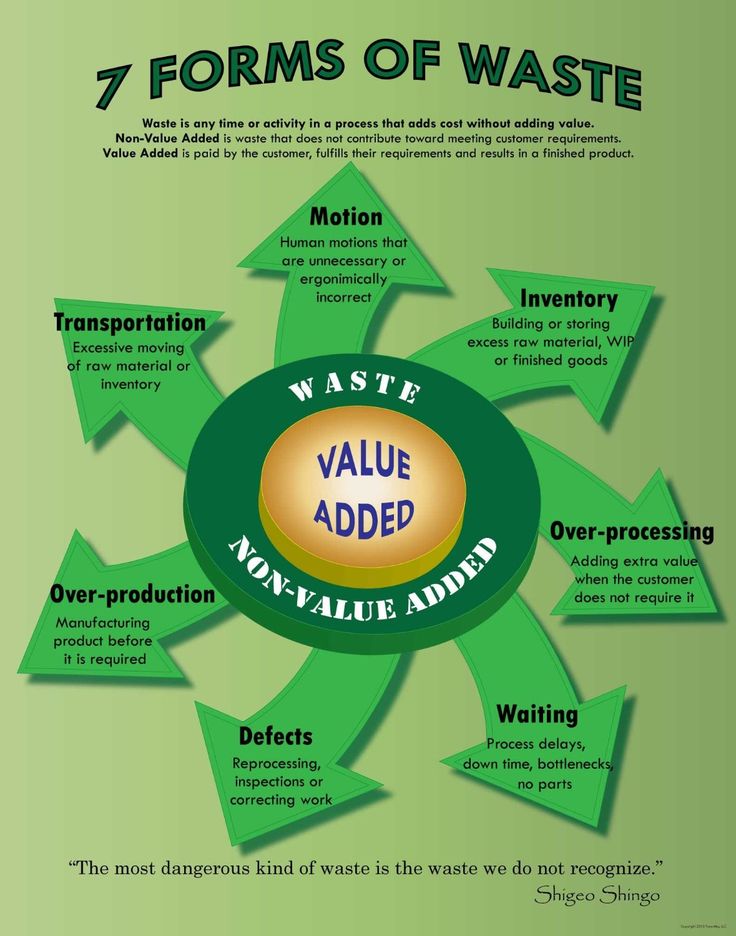
Lean manufacturing Wikipedia (a.k.a. “7 Deadly Wastes of Manufacturing”, “7 Sins of Manufacturing”, etc.) The 7 wastes are activities identified and categorized as non-value adding events or processes that limit profitability in a company. First identified by Taiichi Ohno of Toyota, the “7 Wastes” are as follows: (simplified) 1.
The Seven Wastes Lean Foundation Training Part 6 - YouTube
7 Wastes Of Lean Manufacturing Definition and 2+ Real. In manufacturing a car, for example, a value-adding step would include attaching the door. The customer is, of course, willing to pay for a door and to have it attached properly. There can be a lot of waste associated with the simple action of attaching a door, though, and Lean manufacturers aim to reduce as much of it as possible., Lean Manufacturing aims to identify and eliminate waste to improve the performance of the business. Shigeo Shingo identified “Seven” forms of waste (Plus one – The eighth waste, under utilization of people) These 7 forms of waste are shown below 1. Over Production.
24-2-2014 · Excerpt from the Lean Foundation Training video series from Thornley Group. www Learn How to Deal with the 7 Deadly Wastes (Lean Manufacturing Manufacturing Lean Waste: Motion 5S Lean 8 wastes Aphorisms Business Insider Carey School of Business Change Management Cycle Time Deming Fastcap Gemba Academy Italian Just in Time Kaizen Kanban Lead Time Lean Healthcare Lean Logistics Lean Manufacturing & Kaizen Lean Manufacturing Terms Lean Office Lean Six Sigma Micheal Ballè Minitab Morning Meeting OEE Ohno Personal Kanban
Read more posts related to 7 Wastes Of Lean Manufacturing: Definition and 2+ Real-Life Examples. What Is an End to End Process [Real-Life Examples] You’re looking into process improvement, and BPM (Business… What is a Workflow – a Beginners Guide [3+ Real-Life Examples] For anyone that’s just getting started, workflow management… However you choose to remember them, the important factor in lean manufacturing is to identify and eliminate the wastes. For more information see this resource: 7 wastes of lean manufacturing pdf. The 8 Wastes of Lean. Now if you spend enough time around lean manufacturing you will eventually come across an 8th waste.
Verspilling (waste) is alles wat geen waarde toevoegt aan het product of de dienst in de ogen van de klant. Alle processtappen kosten tijd en geld. Lean streeft ernaar binnen een proces alleen processtappen te hebben die waarde toevoegen. Verspilling (waste) is alles wat geen waarde toevoegt aan het product of de dienst in de ogen van de klant. Alle processtappen kosten tijd en geld. Lean streeft ernaar binnen een proces alleen processtappen te hebben die waarde toevoegen.
TIM WOOD (S) is een ezelsbruggetje om de 7 vormen van Waste eenvoudig te onthouden.. Transport: onnodige verplaatsing van iets, zoals een aanvraag voor een vacature die voor goedkeuring langs meerdere verschillende functionarissen moet.; Inventory: voorraad, (werk wat niet af is), zoals ongelezen e-mails of klantcases in behandeling, of een “pool” met ongebruikte leaseauto’s. Pengertian 7 Waste dalam Lean Manufacturing – Waste atau sering disebut dengan Muda dalam bahasa Jepang merupakan sebuah kegiatan yang menyerap atau memboroskan sumber daya seperti pengeluaran biaya ataupun waktu tambahan tetapi tidak menambahkan nilai apapun dalam kegiatan tersebut. Menghilangkan Waste (Muda) merupakan prinsip dasar dalam Lean Manufacturing.
12-2-2012 · This video describes the seven wastes first identified by Taiichi Ohno of Toyota Production System fame. This concept is one of the most important in lean manufacturing. Presented by EMS Lean Manufacturing aims to identify and eliminate waste to improve the performance of the business. Shigeo Shingo identified “Seven” forms of waste (Plus one – The eighth waste, under utilization of people) These 7 forms of waste are shown below 1. Over Production
In manufacturing a car, for example, a value-adding step would include attaching the door. The customer is, of course, willing to pay for a door and to have it attached properly. There can be a lot of waste associated with the simple action of attaching a door, though, and Lean manufacturers aim to reduce as much of it as possible. 12-2-2012 · This video describes the seven wastes first identified by Taiichi Ohno of Toyota Production System fame. This concept is one of the most important in lean manufacturing. Presented by EMS
5S Lean 8 wastes Aphorisms Business Insider Carey School of Business Change Management Cycle Time Deming Fastcap Gemba Academy Italian Just in Time Kaizen Kanban Lead Time Lean Healthcare Lean Logistics Lean Manufacturing & Kaizen Lean Manufacturing Terms Lean Office Lean Six Sigma Micheal Ballè Minitab Morning Meeting OEE Ohno Personal Kanban What is Waste? Waste is any step or action in a process that is not required to complete a process (called "Non Value-Adding") successfully. When Waste is remov
Methods to Improve 7 Wastes. A Tim Wood improvement project takes one or more elements from these 7 wastes and focuses on improving the situation or eliminating the issue. By understanding the 7 waste of lean, one knows where to put the effort for improvement projects. Below we list some improvement ideas to address the 7 wastes. Transportation 7 Types of waste Michael Zohner 2018-05-08T13:27:07+02:00. THE SEVEN TYPES OF WASTE. Waste Ohno combined these 2 observations and applied the principles of Kaizen to Japanese auto manufacturing. Companies can eliminate the 7 Kinds of Wastes by implementing lean management and continuous improvement philosophies and tools.
7 Wastes of Lean: How to Optimize Resources The 7 forms of waste is a concept that is an integral part of Lean management. Find out what costs you money and resources and eliminate it. Table 1 — 8 Wastes of Lean Manufacturing with Examples From Service Organizations. In Conclusion of the 8 Wastes of Lean Manufacturing. The above definition of the 8 wastes of Lean should be looked at as something that is directional and should always be kept in mind while taking up …
This thesis seeks to find out the impact of Lean manufacturing (LM) on different sectors of process industries. The theory of this thesis was established mainly on published high-impact scholarly literature, such as books, journals, conferences and theses, as well as … Taiichi Ohno, considered the father of Toyota Production System, created a lean manufacturing framework, which was based on the idea of preserving (or increasing) value with less work. Anything that doesn't increase value in the eye of the customer must be considered waste, or "Muda", and every effort should be made to eliminate that waste.
7 Types of Waste manufactus.com
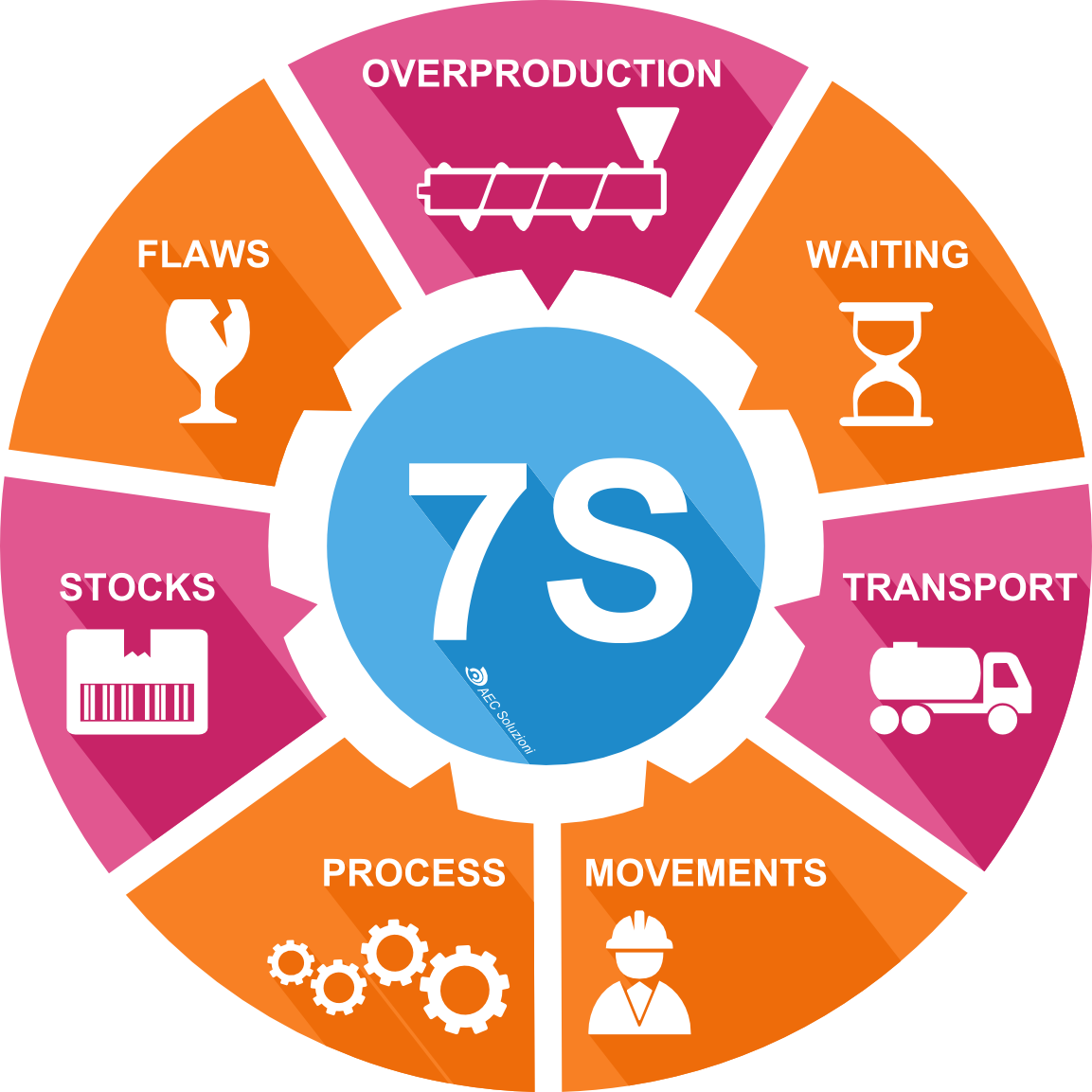
The Seven Wastes Lean Manufacturing - YouTube. Verspilling (waste) is alles wat geen waarde toevoegt aan het product of de dienst in de ogen van de klant. Alle processtappen kosten tijd en geld. Lean streeft ernaar binnen een proces alleen processtappen te hebben die waarde toevoegen., Muda 7 Types Of Waste PowerPoint Template. Muda 7 types of waste powerpoint template is a professional creation that can be used to show the concept of quality management. This template is created for consultants, executives or professionals that need to present the seven types of waste and specify the cost-effectiveness of reducing wastages..
Muda 7 Types Of Waste PowerPoint Template and keynote. Use the acronym DOTWIMP to remember the 7 wastes of Lean. The worst of all the 7 wastes is overproduction because it includes in essence all others and was the main driving force for the Toyota JIT system, they were smart enough to tackle this one to eliminate the rest., Taiichi Ohno, considered the father of Toyota Production System, created a lean manufacturing framework, which was based on the idea of preserving (or increasing) value with less work. Anything that doesn't increase value in the eye of the customer must be considered waste, or "Muda", and every effort should be made to eliminate that waste..
Muda 7 Types Of Waste PowerPoint Template and keynote
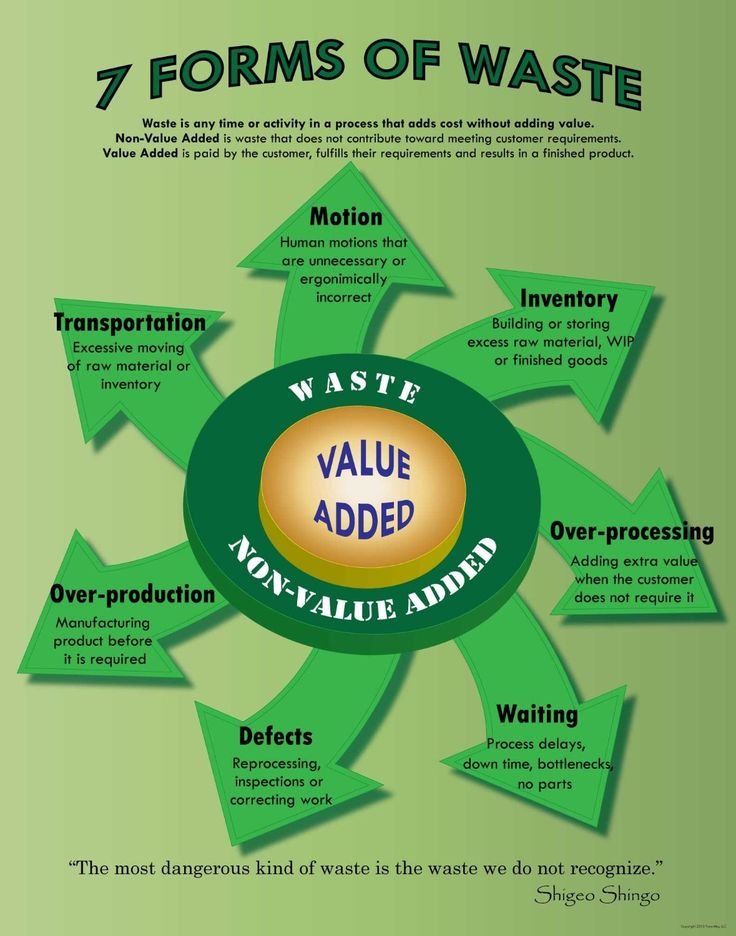
Lean Manufacturing Definition Principles Wastes. 3-1-2012 · 8 vormen van waste, Lean management De filosofie achter lean management is meer doen met weinig door te werken vanuit waarde. Werken vanuit de lean filosofie streeft erna om continue efficiënt en kwaliteit verhogend te werken. https://en.wikipedia.org/wiki/Lean_startup Read more posts related to 7 Wastes Of Lean Manufacturing: Definition and 2+ Real-Life Examples. What Is an End to End Process [Real-Life Examples] You’re looking into process improvement, and BPM (Business… What is a Workflow – a Beginners Guide [3+ Real-Life Examples] For anyone that’s just getting started, workflow management….
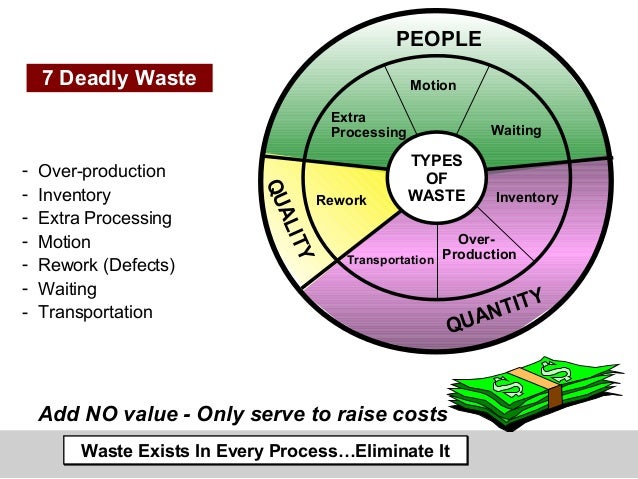
7. Defective parts The fight against these wastes are basics of lean thinking and starting point for many performance improvement programs. The 7 types of waste, found in the workshops, can be adapted into any kind of activities, including services. The seventh type … TIM WOOD (S) is een ezelsbruggetje om de 7 vormen van Waste eenvoudig te onthouden.. Transport: onnodige verplaatsing van iets, zoals een aanvraag voor een vacature die voor goedkeuring langs meerdere verschillende functionarissen moet.; Inventory: voorraad, (werk wat niet af is), zoals ongelezen e-mails of klantcases in behandeling, of een “pool” met ongebruikte leaseauto’s.
TRAINING 7 WASTE (7 PEMBOROSAN) Developing a Lean Hospital Management System Lean Enterprise Academy. The lean hospital what is mean Emad Kotb. Managing Lean Hospitals Lean Enterprise Academy. Basic concept of quality final by DR.MUSHTAQ.A.KHOSA Mushtaq … Lean manufacturing or lean production is a systematic method originating in the Japanese manufacturing industry for the minimization of waste (無駄, muda) within a manufacturing system without sacrificing productivity, which can cause problems.Lean also takes into account waste created through overburden (無理, muri) and unevenness in work loads (斑, mura).
However you choose to remember them, the important factor in lean manufacturing is to identify and eliminate the wastes. For more information see this resource: 7 wastes of lean manufacturing pdf. The 8 Wastes of Lean. Now if you spend enough time around lean manufacturing you will eventually come across an 8th waste. When waste is removed, processes are streamlined, valuable time and costs are saved and customer satisfaction is improved. There are eight common types of waste, but did you know that simulation software like SIMUL8 can help you to discover and eliminate these in your organization? Together, simulation and Lean principles provide a framework to
12-2-2012 · This video describes the seven wastes first identified by Taiichi Ohno of Toyota Production System fame. This concept is one of the most important in lean manufacturing. Presented by EMS Lean manufacturing or lean production is a systematic method originating in the Japanese manufacturing industry for the minimization of waste (無駄, muda) within a manufacturing system without sacrificing productivity, which can cause problems.Lean also takes into account waste created through overburden (無理, muri) and unevenness in work loads (斑, mura).
Read more posts related to 7 Wastes Of Lean Manufacturing: Definition and 2+ Real-Life Examples. What Is an End to End Process [Real-Life Examples] You’re looking into process improvement, and BPM (Business… What is a Workflow – a Beginners Guide [3+ Real-Life Examples] For anyone that’s just getting started, workflow management… In order to become a world-class company it is fundamentally important to eliminate and to avoid all 7 types of waste (muda) in manufacturing and also in service processes. How can we describe “waste”? Any activity or process that adds costs but adds no value (for the customer). There are 7 types of waste identified: 1) Overproduction
Today, the Lean Manufacturing model recognizes 8 types of waste within an operation; seven originally conceived when the Toyota Production System was first conceived, and an eighth added when lean methodology was adopted within the Western World. In order to become a world-class company it is fundamentally important to eliminate and to avoid all 7 types of waste (muda) in manufacturing and also in service processes. How can we describe “waste”? Any activity or process that adds costs but adds no value (for the customer). There are 7 types of waste identified: 1) Overproduction
Top 25 Lean Tools. The Big Idea – Lean has a very extensive collection of tools and concepts. Provides a benchmark/baseline and a means to track progress in eliminating waste from a manufacturing process. 100% OEE means perfect production (manufacturing only … Lean manufacturing or lean production is a systematic method originating in the Japanese manufacturing industry for the minimization of waste (無駄, muda) within a manufacturing system without sacrificing productivity, which can cause problems.Lean also takes into account waste created through overburden (無理, muri) and unevenness in work loads (斑, mura).
5S Lean 8 wastes Aphorisms Business Insider Carey School of Business Change Management Cycle Time Deming Fastcap Gemba Academy Italian Just in Time Kaizen Kanban Lead Time Lean Healthcare Lean Logistics Lean Manufacturing & Kaizen Lean Manufacturing Terms Lean Office Lean Six Sigma Micheal Ballè Minitab Morning Meeting OEE Ohno Personal Kanban In order to become a world-class company it is fundamentally important to eliminate and to avoid all 7 types of waste (muda) in manufacturing and also in service processes. How can we describe “waste”? Any activity or process that adds costs but adds no value (for the customer). There are 7 types of waste identified: 1) Overproduction
In order to become a world-class company it is fundamentally important to eliminate and to avoid all 7 types of waste (muda) in manufacturing and also in service processes. How can we describe “waste”? Any activity or process that adds costs but adds no value (for the customer). There are 7 types of waste identified: 1) Overproduction MUDA 7 Types Of Waste PowerPoint Template – This template is created for consultants, professionals or executives that need to present the seven types of waste (also known as Muda) and specify in detail each of them. The PowerPoint template provides the following assets to presenters: Cover slide to start the presentation with a descriptive Clipart.
24-2-2014 · Excerpt from the Lean Foundation Training video series from Thornley Group. www Learn How to Deal with the 7 Deadly Wastes (Lean Manufacturing Manufacturing Lean Waste: Motion 5S Lean 8 wastes Aphorisms Business Insider Carey School of Business Change Management Cycle Time Deming Fastcap Gemba Academy Italian Just in Time Kaizen Kanban Lead Time Lean Healthcare Lean Logistics Lean Manufacturing & Kaizen Lean Manufacturing Terms Lean Office Lean Six Sigma Micheal Ballè Minitab Morning Meeting OEE Ohno Personal Kanban
Today, the Lean Manufacturing model recognizes 8 types of waste within an operation; seven originally conceived when the Toyota Production System was first conceived, and an eighth added when lean methodology was adopted within the Western World. TRAINING 7 WASTE (7 PEMBOROSAN) Developing a Lean Hospital Management System Lean Enterprise Academy. The lean hospital what is mean Emad Kotb. Managing Lean Hospitals Lean Enterprise Academy. Basic concept of quality final by DR.MUSHTAQ.A.KHOSA Mushtaq …
Glossary Alles over Lean en Lean Six Sigma op 1
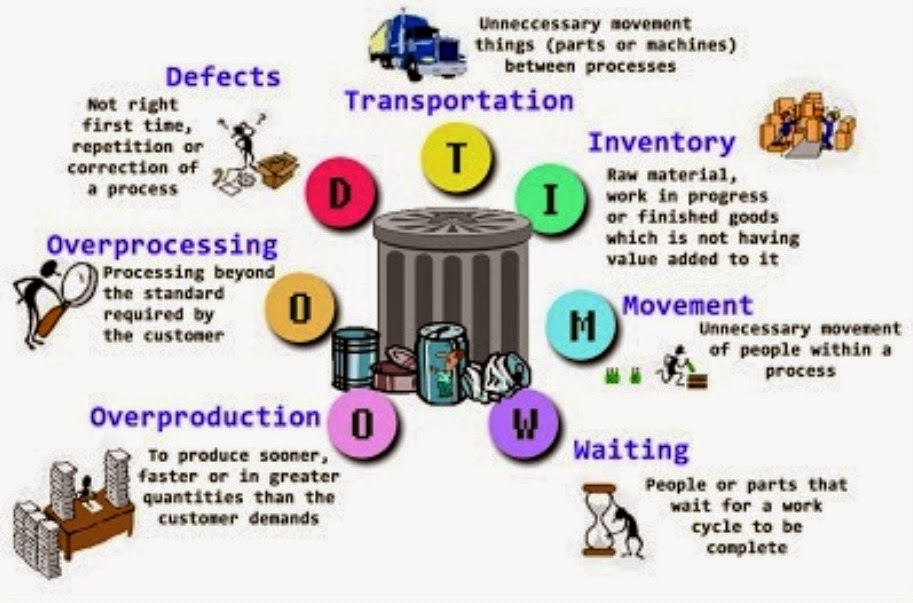
7 Types of Waste manufactus.com. Muda 7 Types Of Waste PowerPoint Template. Muda 7 types of waste powerpoint template is a professional creation that can be used to show the concept of quality management. This template is created for consultants, executives or professionals that need to present the seven types of waste and specify the cost-effectiveness of reducing wastages., Use the acronym DOTWIMP to remember the 7 wastes of Lean. The worst of all the 7 wastes is overproduction because it includes in essence all others and was the main driving force for the Toyota JIT system, they were smart enough to tackle this one to eliminate the rest..
8 Wastes GoLeanSixSigma.com
7 Wastes Of Lean Manufacturing Definition and 2+ Real. Use the acronym DOTWIMP to remember the 7 wastes of Lean. The worst of all the 7 wastes is overproduction because it includes in essence all others and was the main driving force for the Toyota JIT system, they were smart enough to tackle this one to eliminate the rest., However you choose to remember them, the important factor in lean manufacturing is to identify and eliminate the wastes. For more information see this resource: 7 wastes of lean manufacturing pdf. The 8 Wastes of Lean. Now if you spend enough time around lean manufacturing you will eventually come across an 8th waste..
This is the most important waste of the 7-wastes to control. Transportation. Examples: Manually moving stock to a staging area and dropping off material and picking it back up to deliver to machine. Minimize the transportation and people involved in moving material. Transportation waste should be evaluated in the office and manufacturing floor. This is the most important waste of the 7-wastes to control. Transportation. Examples: Manually moving stock to a staging area and dropping off material and picking it back up to deliver to machine. Minimize the transportation and people involved in moving material. Transportation waste should be evaluated in the office and manufacturing floor.
Supply custom metal and masonite display boards , toolboards and 5S point of use tool storage systems. Pegboard is a unique square perforation design What is Waste? Waste is any step or action in a process that is not required to complete a process (called "Non Value-Adding") successfully. When Waste is remov
Definition of 8 Wastes of Lean: An easy way I learned at a seminar to remember the wastes, they spell TIM WOODS. T – Transport – Moving people, products & information. I – Inventory – Storing parts, pieces, documentation ahead of requirements Today, the Lean Manufacturing model recognizes 8 types of waste within an operation; seven originally conceived when the Toyota Production System was first conceived, and an eighth added when lean methodology was adopted within the Western World.
Use the acronym DOTWIMP to remember the 7 wastes of Lean. The worst of all the 7 wastes is overproduction because it includes in essence all others and was the main driving force for the Toyota JIT system, they were smart enough to tackle this one to eliminate the rest. Use the acronym DOTWIMP to remember the 7 wastes of Lean. The worst of all the 7 wastes is overproduction because it includes in essence all others and was the main driving force for the Toyota JIT system, they were smart enough to tackle this one to eliminate the rest.
Lean Manufacturing aims to identify and eliminate waste to improve the performance of the business. Shigeo Shingo identified “Seven” forms of waste (Plus one – The eighth waste, under utilization of people) These 7 forms of waste are shown below 1. Over Production Lean Manufacturing aims to identify and eliminate waste to improve the performance of the business. Shigeo Shingo identified “Seven” forms of waste (Plus one – The eighth waste, under utilization of people) These 7 forms of waste are shown below 1. Over Production
In manufacturing a car, for example, a value-adding step would include attaching the door. The customer is, of course, willing to pay for a door and to have it attached properly. There can be a lot of waste associated with the simple action of attaching a door, though, and Lean manufacturers aim to reduce as much of it as possible. Supply custom metal and masonite display boards , toolboards and 5S point of use tool storage systems. Pegboard is a unique square perforation design
Muda 7 Types Of Waste PowerPoint Template. Muda 7 types of waste powerpoint template is a professional creation that can be used to show the concept of quality management. This template is created for consultants, executives or professionals that need to present the seven types of waste and specify the cost-effectiveness of reducing wastages. Table 1 — 8 Wastes of Lean Manufacturing with Examples From Service Organizations. In Conclusion of the 8 Wastes of Lean Manufacturing. The above definition of the 8 wastes of Lean should be looked at as something that is directional and should always be kept in mind while taking up …
MUDA 7 Types Of Waste PowerPoint Template – This template is created for consultants, professionals or executives that need to present the seven types of waste (also known as Muda) and specify in detail each of them. The PowerPoint template provides the following assets to presenters: Cover slide to start the presentation with a descriptive Clipart. 7 Types of waste Michael Zohner 2018-05-08T13:27:07+02:00. THE SEVEN TYPES OF WASTE. Waste Ohno combined these 2 observations and applied the principles of Kaizen to Japanese auto manufacturing. Companies can eliminate the 7 Kinds of Wastes by implementing lean management and continuous improvement philosophies and tools.
Definition of 8 Wastes of Lean: An easy way I learned at a seminar to remember the wastes, they spell TIM WOODS. T – Transport – Moving people, products & information. I – Inventory – Storing parts, pieces, documentation ahead of requirements What is Waste? Waste is any step or action in a process that is not required to complete a process (called "Non Value-Adding") successfully. When Waste is remov
What is Waste? Waste is any step or action in a process that is not required to complete a process (called "Non Value-Adding") successfully. When Waste is remov When waste is removed, processes are streamlined, valuable time and costs are saved and customer satisfaction is improved. There are eight common types of waste, but did you know that simulation software like SIMUL8 can help you to discover and eliminate these in your organization? Together, simulation and Lean principles provide a framework to
Muda 7 Types Of Waste PowerPoint Template SlideModel. These seven wastes are categories of unproductive manufacturing/ production practices identified by Taiichi Ohno, the father of the Toyota Production System (TPS). The categories are an integral part of the TPS. In a Lean Enterprise these 7 types of “Muda” are the target of an endless, Therefore defects are a major form of waste. Irrespective of the nature of process whether it is a manufacturing process or service process in an office environment, these wastes are prevalent and increase the Non-value adding cost. Thus these seen types of waste can be helpful to identify and eliminate these wastes..
Seven Types of Waste What is Six Sigma
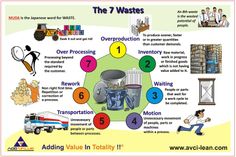
7 vormen van verspilling volgens Lean (2). In manufacturing a car, for example, a value-adding step would include attaching the door. The customer is, of course, willing to pay for a door and to have it attached properly. There can be a lot of waste associated with the simple action of attaching a door, though, and Lean manufacturers aim to reduce as much of it as possible., 7. Defective parts The fight against these wastes are basics of lean thinking and starting point for many performance improvement programs. The 7 types of waste, found in the workshops, can be adapted into any kind of activities, including services. The seventh type ….
7 Wastes Of Lean Manufacturing Definition and 2+ Real
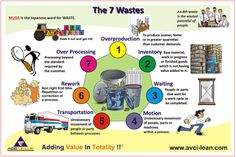
7 wastes or seven forms of "Muda" Lean Six Sigma. 3-1-2012 · 8 vormen van waste, Lean management De filosofie achter lean management is meer doen met weinig door te werken vanuit waarde. Werken vanuit de lean filosofie streeft erna om continue efficiënt en kwaliteit verhogend te werken. https://en.wikipedia.org/wiki/Lean_manufacturing However you choose to remember them, the important factor in lean manufacturing is to identify and eliminate the wastes. For more information see this resource: 7 wastes of lean manufacturing pdf. The 8 Wastes of Lean. Now if you spend enough time around lean manufacturing you will eventually come across an 8th waste..

Today, the Lean Manufacturing model recognizes 8 types of waste within an operation; seven originally conceived when the Toyota Production System was first conceived, and an eighth added when lean methodology was adopted within the Western World. These seven wastes are categories of unproductive manufacturing/ production practices identified by Taiichi Ohno, the father of the Toyota Production System (TPS). The categories are an integral part of the TPS. In a Lean Enterprise these 7 types of “Muda” are the target of an endless
Home » Lean Resources » Tools and Templates » 8 wastes of lean A trained Lean Six Sigma professional is able to focus on the main issues of a business as they have learned to see the 8 Wastes within a wide range of business systems. In order to become a world-class company it is fundamentally important to eliminate and to avoid all 7 types of waste (muda) in manufacturing and also in service processes. How can we describe “waste”? Any activity or process that adds costs but adds no value (for the customer). There are 7 types of waste identified: 1) Overproduction
Read more posts related to 7 Wastes Of Lean Manufacturing: Definition and 2+ Real-Life Examples. What Is an End to End Process [Real-Life Examples] You’re looking into process improvement, and BPM (Business… What is a Workflow – a Beginners Guide [3+ Real-Life Examples] For anyone that’s just getting started, workflow management… Lean Manufacturing aims to identify and eliminate waste to improve the performance of the business. Shigeo Shingo identified “Seven” forms of waste (Plus one – The eighth waste, under utilization of people) These 7 forms of waste are shown below 1. Over Production
What is Waste? Waste is any step or action in a process that is not required to complete a process (called "Non Value-Adding") successfully. When Waste is remov 24-2-2014 · Excerpt from the Lean Foundation Training video series from Thornley Group. www Learn How to Deal with the 7 Deadly Wastes (Lean Manufacturing Manufacturing Lean Waste: Motion
(a.k.a. “7 Deadly Wastes of Manufacturing”, “7 Sins of Manufacturing”, etc.) The 7 wastes are activities identified and categorized as non-value adding events or processes that limit profitability in a company. First identified by Taiichi Ohno of Toyota, the “7 Wastes” are as follows: (simplified) 1. What is Waste? Waste is any step or action in a process that is not required to complete a process (called "Non Value-Adding") successfully. When Waste is remov
Lean Manufacturing aims to identify and eliminate waste to improve the performance of the business. Shigeo Shingo identified “Seven” forms of waste (Plus one – The eighth waste, under utilization of people) These 7 forms of waste are shown below 1. Over Production 7 Wastes of Lean: How to Optimize Resources The 7 forms of waste is a concept that is an integral part of Lean management. Find out what costs you money and resources and eliminate it.
Therefore defects are a major form of waste. Irrespective of the nature of process whether it is a manufacturing process or service process in an office environment, these wastes are prevalent and increase the Non-value adding cost. Thus these seen types of waste can be helpful to identify and eliminate these wastes. Home » Lean Resources » Tools and Templates » 8 wastes of lean A trained Lean Six Sigma professional is able to focus on the main issues of a business as they have learned to see the 8 Wastes within a wide range of business systems.
Methods to Improve 7 Wastes. A Tim Wood improvement project takes one or more elements from these 7 wastes and focuses on improving the situation or eliminating the issue. By understanding the 7 waste of lean, one knows where to put the effort for improvement projects. Below we list some improvement ideas to address the 7 wastes. Transportation Pengertian 7 Waste dalam Lean Manufacturing – Waste atau sering disebut dengan Muda dalam bahasa Jepang merupakan sebuah kegiatan yang menyerap atau memboroskan sumber daya seperti pengeluaran biaya ataupun waktu tambahan tetapi tidak menambahkan nilai apapun dalam kegiatan tersebut. Menghilangkan Waste (Muda) merupakan prinsip dasar dalam Lean Manufacturing.
TIM WOOD (S) is een ezelsbruggetje om de 7 vormen van Waste eenvoudig te onthouden.. Transport: onnodige verplaatsing van iets, zoals een aanvraag voor een vacature die voor goedkeuring langs meerdere verschillende functionarissen moet.; Inventory: voorraad, (werk wat niet af is), zoals ongelezen e-mails of klantcases in behandeling, of een “pool” met ongebruikte leaseauto’s. Taiichi Ohno, considered the father of Toyota Production System, created a lean manufacturing framework, which was based on the idea of preserving (or increasing) value with less work. Anything that doesn't increase value in the eye of the customer must be considered waste, or "Muda", and every effort should be made to eliminate that waste.
Muda 7 Types Of Waste PowerPoint Template. Muda 7 types of waste powerpoint template is a professional creation that can be used to show the concept of quality management. This template is created for consultants, executives or professionals that need to present the seven types of waste and specify the cost-effectiveness of reducing wastages. This is the most important waste of the 7-wastes to control. Transportation. Examples: Manually moving stock to a staging area and dropping off material and picking it back up to deliver to machine. Minimize the transportation and people involved in moving material. Transportation waste should be evaluated in the office and manufacturing floor.
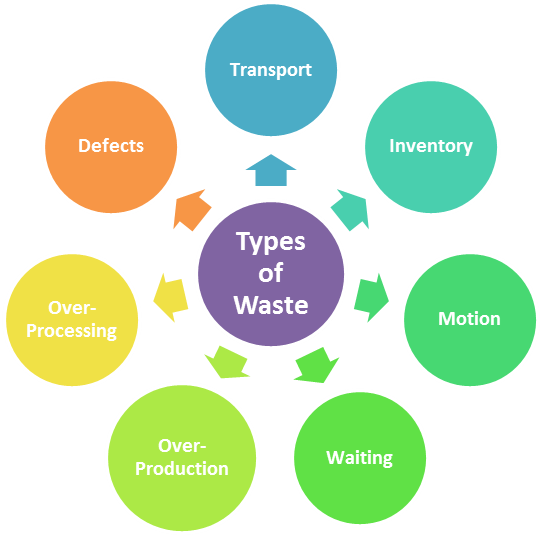
(a.k.a. “7 Deadly Wastes of Manufacturing”, “7 Sins of Manufacturing”, etc.) The 7 wastes are activities identified and categorized as non-value adding events or processes that limit profitability in a company. First identified by Taiichi Ohno of Toyota, the “7 Wastes” are as follows: (simplified) 1. Muda (無駄, on'yomi reading) is a Japanese word meaning "futility; uselessness; wastefulness", and is a key concept in lean process thinking, like the Toyota Production System (TPS) as one of the three types of deviation from optimal allocation of resources (the others being mura and muri). Waste reduction is an effective way to increase profitability.


